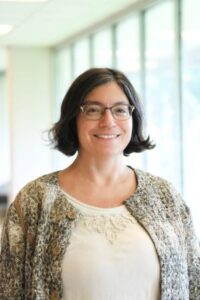
Cigdem (pronounced Chee-Dem) Capan is deeply motivated to share her love of science with the next generation. A materials physicist, she teaches at Washington State University at Tri-Cities in the physics and astronomy department. Cigdem is quick to note that she is learning more about renewable energy, which is not her specific scientific focus, from experts in the field like Horse Heaven Clean Energy Center’s engineers. For Cigdem, understanding and valuing the science behind renewable energy is something everyone can and should embrace.
Originally from Turkey, Cigdem studied in France before moving to the United States. She taught everywhere from Louisiana to California, before landing in the Tri-Cities over a decade ago, and where she has now made a home for herself and her 10-year-old son. They love exploring the region and gaining valuable learning experiences along the way.
One of Cigdem’s cherished bonding moments with her son was a Mother’s Day trip to a farm outside of Ellensburg. The farm hosted an event that included cupcakes, a flower meadow, and tours of their wind turbines.
“My little boy loved it,” said Cigdem. “He had a hard hat on and got to see these incredible things up close. It was fascinating for him and for me.”
Learning about the engineering and science behind renewable energy is something Cigdem wants to offer to her students and the community as well. She thinks that with the history of resource and energy production in the Tri-Cities region, the area could be a great hub for those interested in exploring science.
“We have this heritage of being an energy pioneer, and we have a lot of scientists and engineers living here,” Cigdem notes. “I can imagine the possibility for cultural benefit to our region if we can offer public science education using our history to share information and engage people on these topics.”
As a professor, Cigdem has several former students who have gone on to study clean energy in their advanced coursework. With the possibility of projects like the Horse Heaven Clean Energy Center, she imagines even more learning opportunities in and out of the classroom could be possible for her students and other young people in the community. This includes the need for mentorship and training for young renewable energy engineers who are starting their journeys in her classroom.
“My students are reasonably aware of climate change, they are very interested when I bring in speakers on climate change or clean energy,” Cigdem says. “I can encourage them to study these things. I would love clean energy engineers to come and talk to my students. These students are our future workforce.”
Cigdem’s interest in renewable energy stems from a deep concern about climate change and its increasing impact on so many parts of our lives. From energy demand, to crop production, to water scarcity, to livability in the region, Cigdem is viewing renewable energy as a critical part of an interconnected series of impacts and needs created by climate change.
“We have agriculture to support, a growing economy to support, more extreme heat and cold snaps that demand more energy to support all of us,” she says. ”And with more demand on the energy grid, what we are seeing now is blackouts. I’m very concerned about what happens if we don’t expand our energy production.”
Expanding our energy production for Cigdem doesn’t mean going back to fossil fuels. She is supportive of the state’s goal to become fossil fuel independent by 2030. Though, as infrastructure remains unbuilt, she is deeply worried that we won’t meet our energy needs in the time available. As the western U.S. is experiencing higher energy demand, black and brown outs are becoming more common. This puts additional strain on Eastern Washington energy resources that are currently being directed to California. Cigdem would like to see more energy produced and kept at home in Washington for the local community’s benefit and security.
“We just don’t have the luxury of time. People don’t appreciate how fast we need to move on new energy generation or how vulnerable we really are,” Cigdem warns. “We are experiencing the impacts of climate change in so many aspects of our lives, so we also don’t have the luxury of picking and choosing our energy – all clean energy is good.”
Because the Horse Heaven Clean Energy Center will have solar, wind, and battery storage, Cigdem is optimistic about the project helping to meet the need for a more diverse and reliable energy mix. When the wind isn’t blowing, the sun may be shining. And when both are available, energy can be stored for another time. This interplays with hydropower, so that when solar and wind are in use, lower demand will be placed on river and water systems which also need to serve irrigation, fishing, and recreational needs on top of energy production.
“We need to offer more energy sources or we will hit a wall. We can coexist with hydro without putting too many demands on one resource,” explains Cigdem. “You don’t have to be a scientist or engineer to understand that.”
Ultimately, Cigdem is hopeful that the Horse Heaven Clean Energy Center and other projects like it will be able to come online to meet the increasing needs for energy in the state. She is also hopeful that these projects can bring the community together through expanded learning opportunities, jobs, agricultural investments, and more public connections to the energy heritage of the region.
“Without change, we cannot move forward,” Cigdem adds. “I would love to see Horse Heaven Clean Energy Center host the community so that people can learn more and build appreciation for what is possible.”
*The views expressed in this piece are from Cidgem Capan, and not on behalf of Washington State University.
